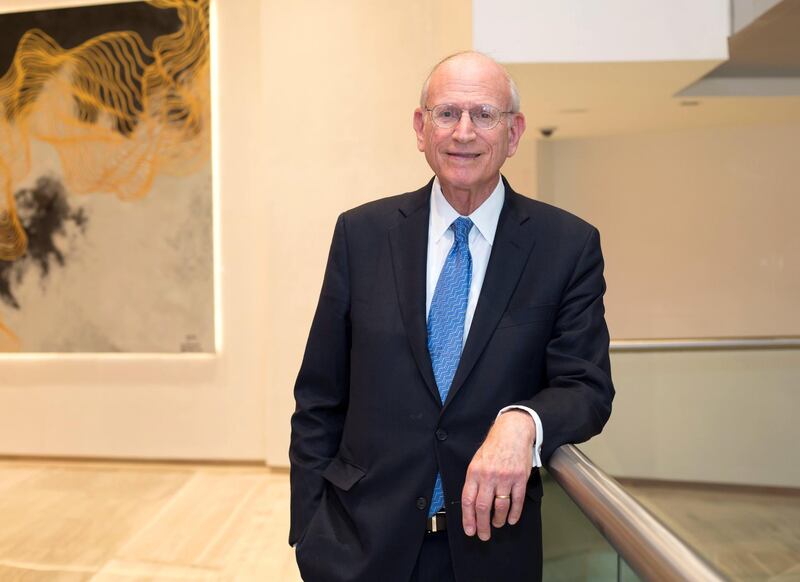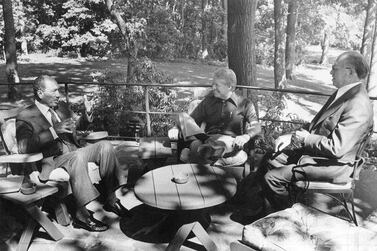After more than a week of fraught negotiations at Camp David in 1978, Cyrus Vance, the US secretary of state, burst into President Jimmy Carter’s room.
“[Anwar] Sadat is leaving,” he declared. The Egyptian president, who had travelled to the Maryland retreat for historic but risky talks with Israeli prime minister Menachem Begin, had demanded a helicopter, his bags already packed.
What followed, according to Mr Carter’s chief White House domestic policy adviser Stuart Eizenstat, was one of the “most emotional and historic scenes in the highly charged politics and diplomacy of the modern Middle East”.
After making his way to Begin’s cabin, Mr Carter appealed to Sadat “in the most deeply personal way”.
The Egyptian relented. When talks later faced last-minute collapse owing to Israeli inflexibility over Jerusalem, eight photographs personally addressed to each of Begin’s grandchildren by Carter broke the impasse.
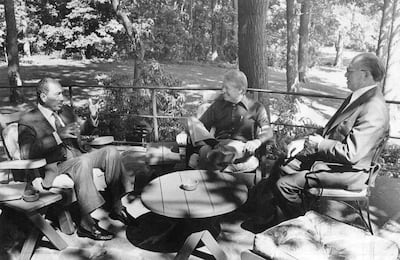
The historic peace deal between Egypt and Israel that followed, as well as a framework for wider peace in the region, would result in a Nobel Peace Prize for Begin and Sadat.
It is one of the many reasons Mr Carter’s time in the White House deserves radical reappraisal, according to Mr Eizenstat, 76, who last year released an acclaimed 900-page insider’s account of the maligned presidency.
Remembered for a disastrous Iranian hostage crisis and botched rescue mission, as well as an oil crisis and flagging economy, the Georgia peanut farmer's term has often been seen as a failure.
But speaking to The National on a recent tour of the UAE, Mr Eizenstat insisted that Mr Carter laid the groundwork for many of the successes Ronald Reagan gets credit for – including a vastly improved economy and the defeat of the Soviet Union.
Not only that, but he claims Mr Carter could even have delivered a lasting peace deal in the Middle East had he won a second term and not lost in a landslide to Reagan in 1980.
“I believe to this day, if Carter had been re-elected, we would have a very, very different situation in the West Bank and Gaza,” Mr Eizenstat said. “Carter had a very strong commitment to both Israel’s security and a Palestinian homeland.
"He was perhaps the first and last US president to make the Middle East peace process a central priority. It took up a substantial part of his time."
In his book, Mr Eizenstat reveals that Mr Carter privately declared he was willing to lose the 1980 election if it meant delivering a Middle East peace settlement. His advocacy of the Palestinian cause often brought criticism from an organised and influential pro-Israeli lobby in the US, which President Donald Trump has unashamedly courted.
It was the trust and personal rapport he earned from Arabs as well as Israelis that allowed Mr Carter to be successful at Camp David, Mr Eizenstat said. In contrast, he fears Mr Trump's provocations, such as moving the US embassy to Jerusalem and recent recognition of Israeli sovereignty over the annexed Golan Heights, mean the president's long-awaited "Deal of the Century" designed to solve the Palestine and Israel issue will be dead on arrival.
"For an American president to be successful in a Middle East peace process, or for that matter in any negotiation, he has to be trusted by both sides," said Mr Eizenstat, who held senior positions in Bill Clinton's administration and also worked for Barack Obama and Hillary Clinton.
“[Jared] Kushner and [Jason] Greenblatt are in the region now. I hope and pray they’ll be successful. But with some of the unilateral steps they’ve endorsed, the embassy, cutting off aid to the Palestinians, Golan Heights, that trust that has to be on both sides may be very difficult.”
With the Israeli elections over, there is speculation that Mr Trump’s peace plan will be revealed within weeks.
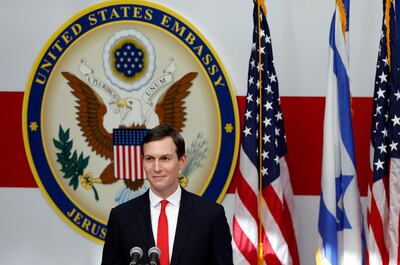
Mr Kushner, Mr Trump's son-in-law, is responsible for solving the Palestinian-Israeli issue, with a "non-traditional" solution expected. Mr Trump's claim that the re-election of Benjamin Netanyahu, who during the election campaign pledged to annex Jewish settlements in the occupied West Bank, will increase chances of peace was met with incredulity by many experts.
The proposals may be "heavy on the economic side and light on the political side", Mr Eizenstat predicted, and said he was unsure whether it would call for a two-state solution, which for decades was the focus of ending the conflict.
Instead, countries in the region may be asked to contribute to a large economic package for the West Bank and Gaza. There may also be restrictions on future Israeli settlements, he said.
Mr Eizenstat said a two-state solution remained the only way to deliver economic and political control to Palestinians while keeping Israel as a majority Jewish, democratic state. A rise in illegitimate Israeli settlements, though, makes it increasingly hard to achieve.
He said Palestinian insistence on a right to return to territories in what is now Israel which they or their ancestors fled or were expelled from is another area that has proved problematic in previous talks.
Under Mr Clinton, while serving as Treasury deputy secretary, Mr Eizenstat recalls optimism at increased economic co-operation between Israel, Palestinians and neighbouring states that recognised it.
In 1997, the US Congress passed legislation creating what were known as Qualifying Industrial Zones, which allowed tariff-free access to US markets for goods made in special free-trade areas in Jordan and Egypt, if they contained a small level of Israeli input.
But the second Camp David summit, in 2000, ended in failure.
"Even after Carter there was still a chance," Mr Eizenstat said. "I had negotiated between 1997 and 2000, a half dozen times directly with [Yasser] Arafat.
“I went to Jordan and I saw one of the industrial zones there, in a northern Jordanian town called Irbid. I go into this plant, it’s like half a football field long, massive. This was the more fundamentalist religious area in Jordan, with women stitching and sewing and so forth.
“The manager says to me, ‘Mr Secretary would you like to know what they’re making?’ I said sure. These fundamentalist women were making lingerie for Victoria’s Secret. I said ‘that’s the peace process’.
“I came back to see Arafat in Ramallah, I’m beginning to talk to him about what we can do more on the economic side.
“And he says, before you start I want you to give a message to your president. He said tell President Clinton not to invite me to the second Camp David summit.
“He said I’m not prepared to make the compromises he wants. The president invites him anyway, he goes.
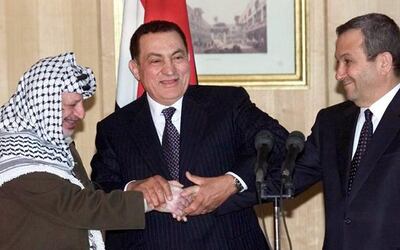
“The Israeli Prime Minister is a former general, Ehud Barak.
“At that Camp David second summit, Barak offers him 95 per cent of the West Bank as a Palestinian state, East Jerusalem as the capital of the Palestinian state, 50,000 refugees who can petition to come back if they still have family in Israel, to live with them.”
Arafat rejected the proposal.
"The basic problem, and I've thought about this long and hard, is the Palestinian leadership can't accept compromising" on the right of return, Mr Eizenstat said.
“In the meantime a vacuum has been created, and it has been filled by settlers, more conservative government under Netanyahu, and now the settlements pockmark the West Bank and make it much more difficult to have a contiguous Palestinian state.”
For many observers, the only way a two-state solution could be salvaged is with a new occupant in the White House. The chances of Mr Trump winning re-election are at least 50 per cent, Mr Eizenstat believes, with his status as an incumbent and strength of the economy significant advantages.
However, he said Mr Trump's divisive rhetoric offers an opportunity for Democrats, with moderate voters increasingly concerned with his "stoking of divisions" between racial groups.
He hopes Joe Biden will soon enter the race for the Democratic nomination, believing a moderate will stand a far better chance against Mr Trump, who, he warned, should not be underestimated again.
He described the Republican as a “political genius” who had recognised and exploited a nationalist wave which had also manifested itself in Brexit and anti-establishment victories in countries such as Italy, Brazil and Hungary.
“We need to have somebody who can keep the energy of the left, but come up with solutions that are reasonable,” he said.
“Some of the major candidates are taking positions on the left that will offend the people in the middle who we need: reparations for slavery, the so-called green new deal, Medicare for all, packing the Supreme Court.
“I worked very hard for Hillary. I did a lot of her Iran and Israel policy work. I really worked very closely with her, so much so that the Russians hacked my computer. But she did not have a feel for working-class concerns.
“Maybe it’s unfair but she came across as a sort of eastern elite. Biden is different, he has working-class roots, he understands it’s not only minorities who have problems but white working-class people – the opioid problem, declining wages, plant closures. He can speak to those workers.
“[Modern populism] is caused by the rapidity of change, but people don’t blame technology, you can’t kick your computer, so they blame it on foreigners, blame it on unfair competition.
“Democrats, myself included, underestimated Trump in 2016. Now we see all these eccentricities and there’s a danger of underestimating him again. But he is a brilliant politician.
“That’s why we’ve got to have a candidate who understands those forces but can say in a positive way, we don’t have to be negative about our neighbours to address your concerns.”
